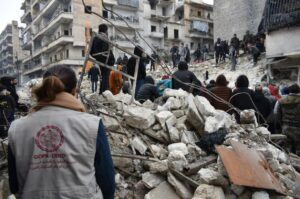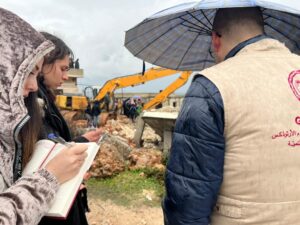When a 7.8-magnitude earthquake struck Türkiye and Syria on February 6, many people in the region were reminded of the sounds of bombs, blasts and airstrikes. Cities that have been reduced to rubble echo memories of war and devastation. As of Thursday, over 20,000 people have lost their lives, making the disaster the world’s deadliest earthquake in over a decade and the strongest in the region in the past century.
The tragedy has only added to the unceasing collective trauma of the refugee population in the region. Türkiye is currently the world’s top refugee host country and is home to 3.6 million Syrian refugees. Many of the people impacted by this earthquake within Syria’s borders are also people who have been forced from their homes in other parts of the country. According to Care, “one of the hardest hit regions has been northwest Syria, where more than 60% of the area’s 4.6 million people are internally displaced.” Northern Syria is also home to three of the 12 Palestinian refugee camps that house 438,000 individuals. The UNHCR confirmed that one family of six residing in the camps was killed during the earthquake.
This earthquake occurred in the middle of a brutal winter, too. In Syria, a collapsing economy and fuel crisis has meant a winter with no heat for many Syrians. Rescue teams are having to work rapidly against time and snowfall as freezing temperatures threaten to take more lives. In both countries, power outages have only exacerbated the situation and created dangerous and intolerable conditions in hospitals.
The collapsed infrastructure has also blocked the only United Nations-approved crossing between Türkiye and Syria, making it extremely difficult to deliver supplies to residents. Other crossings and roads have also been blocked by collapsed buildings and snow. Prior to the earthquake, these communities relied heavily on humanitarian support and supplies. Northwest Syria is especially reliant on access to medical supplies and water due to the recent cholera outbreak. Now, these communities have additional grievances and more difficulty getting access to what they need.
The psychological impact on those affected by this earthquake, especially for people who have fled war and trauma, is striking. The effects of war are enough to severely harm the mental well-being of a person. For years, millions of people who fled war in their countries have had to manage these psychological effects while working to restart their lives. The disaster will now force them to rebuild their lives once again.
At CWS, we are beyond heartbroken by the human impact of this disaster. To experience as much hardship as those affected have had to experience is nothing short of cruel. In these dire situations, however, our only option is to believe in humanity and remember that against all odds, people continue to be resilient and move beyond tragedy.
CWS was a founding member of the ACT Alliance, partially for situations exactly like this one. We believe that after a disaster, when efficiency is key and international generosity swells, it’s best to channel funds and support to member organizations that are already on the ground and have the staff and infrastructure in place to respond. Sometimes that organization is CWS, and our ACT partners surround us with the support and funds we need to respond quickly and effectively. Other times, it’s our turn to support partners that have staff and programming in place to reach our impacted neighbors swiftly. Because CWS does not have current programs in Türkiye and Syria, but our ACT Alliance partners do, we are using the funds that the CWS family is generously providing to support our ACT and other partners. Support the relief effort here.
More information on the ACT Alliance response can be found here.


